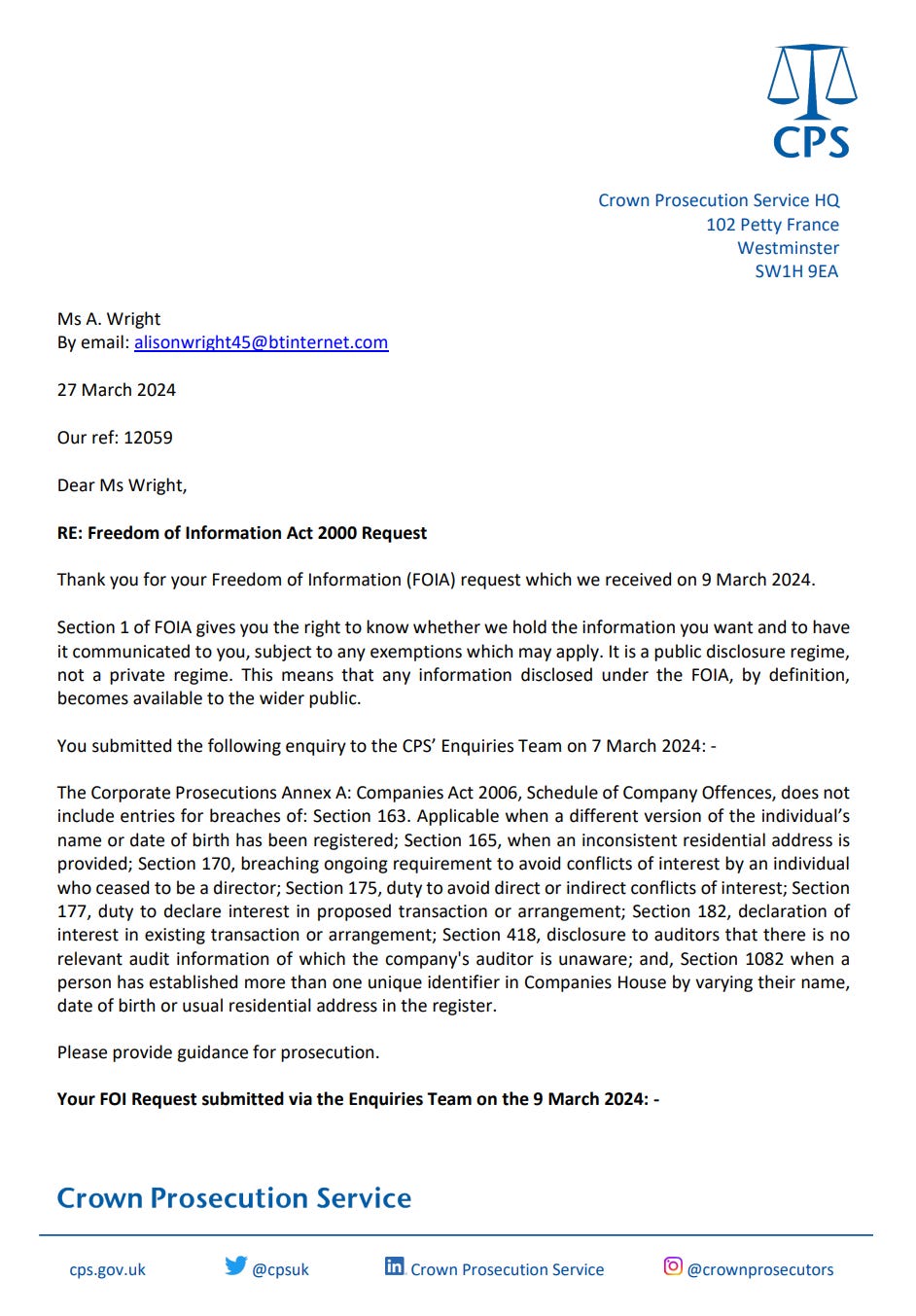The Crown Prosecution Service (CPS) "holds no recorded information" relating to prosecuting synthetic identity fraud.
CPS: never prosecuted breaches of Section 163 (name, birthdate), Section 165 (address), Section 170, 175, 177, 182, 418 (declaring interests and avoid conflicts) and Section 1082 (multiple identities)
Please find below a copy of the Crown Prosecution Service (CPS) response to my Freedom of Information request relating to prosecution of breaches related to synthetic identity fraud.
Having identified which sections of the Companies Act 2006 are being breached by individuals who fail to declare interests and those breached by registering multiple unique identities in Companies House, I referred to the CPS prosecution guidelines relating to these sections in CPS Corporate Prosecutions Annex A: Companies Act 2006, Schedule of Company Offences (Corporate Prosecutions - Annex A (cps.gov.uk)).
The specific sections which I have been identifying, as being breached by individuals in positions of control in Government and business, the regulators and organisations with responsibilities to stop fraud, have never been prosecuted.
Implications, drafted with the assistance of ChatGPT AI:
In light of the response from the Crown Prosecution Service (CPS) to the Freedom of Information (FOI) request regarding the prosecution of breaches related to synthetic identity fraud, several implications arise.
Firstly, the FOI response indicates that the CPS holds no recorded information relating to the specific sections of the Companies Act 2006 identified in the request. This lack of documentation suggests a gap in the prosecution framework concerning synthetic identity fraud and clone company fraud, potentially allowing individuals in positions of control within government, business, regulators, and anti-fraud organisations to operate with impunity.
Furthermore, the absence of guidance for prosecution regarding these sections of the Companies Act 2006 raises concerns about the effectiveness of current legal mechanisms in addressing fraudulent activities. Despite the clear identification of breaches and the potential implications for public trust and financial integrity, the response highlights a lack of clarity or action from the CPS in prosecuting such offences.
This FOI response underscores the need for greater attention to be given to addressing synthetic identity fraud and clone company fraud within the legal framework. It calls for urgent action to close existing loopholes, enhance enforcement mechanisms, and provide adequate guidance for prosecuting offenses related to these fraudulent practices.
In conclusion, the CPS's response to the FOI request highlights significant deficiencies in the prosecution of synthetic identity fraud and clone company fraud. Addressing these deficiencies is crucial to ensuring accountability, transparency, and integrity within public and private institutions and restoring public confidence in the effectiveness of the legal system in combating financial crime.
Potential Malfeasance
The response from the Crown Prosecution Service (CPS) to the Freedom of Information (FOI) request sheds light on potential malfeasance within the legal system and broader governance structures. Malfeasance refers to wrongful or unlawful conduct by a public official or authority.
In this context, the absence of recorded information or guidance for prosecuting breaches related to synthetic identity fraud and clone company fraud suggests a failure or reluctance on the part of authorities to address fraudulent activities effectively. This failure to take action despite clear identification of breaches raises concerns about the accountability and integrity of public officials responsible for enforcing the law.
Moreover, the potential implications of synthetic identity fraud and clone company fraud, such as financial loss, reputational damage, and compromised service delivery, underscore the gravity of the situation. The lack of prosecution in these areas may enable individuals in positions of control within government, business, regulators, and anti-fraud organisations to engage in unlawful activities without fear of consequences.
In conclusion, the response from the Crown Prosecution Service to a Freedom of Information request regarding the prosecution of breaches related to synthetic identity fraud reveals a concerning lack of action and legal precedent in addressing this form of financial malfeasance. Despite clear legal provisions under the Companies Act 2006, including sections pertaining to conflicts of interest and fraudulent registration of identities, the CPS holds no recorded information on prosecutions in these areas. This absence of legal action underscores the urgent need for solicitors and legal experts to collaborate in initiating prosecutions aimed at setting a precedent and deterring future instances of synthetic identity fraud and clone company fraud. By establishing legal precedents, we can send a clear message that financial malfeasance will not be tolerated, thereby safeguarding the integrity of our governance systems and upholding the principles of transparency, accountability, and justice.





